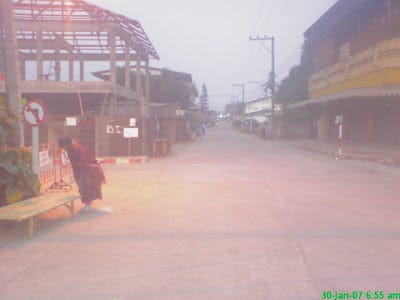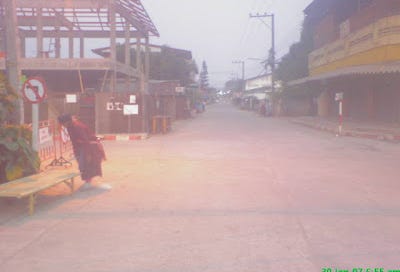
Into infinity, the Russel Drysdale way. This is a picture of the Pai streets early in the morning. I've always been an early riser and was down at the bus station before dawn, warming myself against the fire at the stall at the bus station, the coals welcome in the freeze of the night. During the day, and freshening into night, particularly on the weekends, there were flocks of Thai tourists up from Bangkok. Nothing was trendier than to immediately get on your mobile and tell your friends you were in Pai and it was beautiful and it was freezing. Sixty three million people; all on the move; a new affluence as surge after surge of economic activity overlaid what had once been an essentially rural country. They took us away from you. They called to you in fractured conversation; and in the morning, when the streets were quiet, that was when he felt most truly at peace.
The coffees, instant, with dairy substitute and sugar, were ten baht each. After a few mornings they greeted me with smiles, but never tried to speak English. It reminded me of times thirty years ago, when I had come to Asia; and it had been an entirely different place. I guess it sounds appalling; but what came as a surprise somehow was that all this progress and technology we regard as so Western, they've got it all in abundance and often far better sophistication than we have. It seemed so Stalinist and grey when I got back; over-regulated; no night life; certainly no bars spilling out into the street at night; Good Time Long Time; We Are Sorry, We are Open; Closed, we never Open; the splendidly haphazard English and times I would never forget; long ago a rural idyll locked in a bubble.
It was impossible to forget. I went to one of the best parties I've been to for a very long time; in a wealthy area of Phuket; the astonishing houses rising on the hill. We wound up through the gated community of absolute wealth till we got to one of the top houses. The party was on the roof, which was an enormous open bar with spectacular views up and down the island. And we were giving them money? It's impossible to believe a tsunami went through there only two years ago. We couldn't clinch. We hadn't danced and laughed like that for a very long time. There was a dizzying depth; people talking out on the patio, perched out over the pool; everything in perfect taste; everyone in their thirties and making money; plenty of money; that alcohol free; the well manned bar mixing cocktails till dawn; the music just the best the world had to offer. The axis had shifted.
THE BIGGEST STORY:
Cheney visit prompts protests
Protesters demonstrating against the US Vice-President's Australian visit clash with police outside Sydney's Town Hall.Photo: Lisa Wiltse
AdvertisementAdvertisement
February 22, 2007 - 9:01PM
Ten people have been arrested in Sydney during violent clashes between police and protesters at a rally ahead of the arrival of US Vice-President Dick Cheney.
The protest, organised by Stop the War Coalition at Town Hall, turned nasty when about 200 people attempted to break a line of police and march to the US Consulate in Martin Place.
The officers, supported by a line of mounted police, held their positions as activists attempted to break through.
Ten people were arrested in the scuffle with police which calmed after officers negotiated with organisers to allow the group to march on the footpath during busy peak hour traffic.
Superintendent Ron Mason, from The Rocks Local Area Command, said police supported the right to demonstrate as long as there was no disruption to the community.
He said an application from the demonstrators was received but it was unreasonable for demonstrators to block busy streets during peak hour.
"Police have been negotiating for days with this group and they agreed to hold a static demonstration at Town Hall,'' Supt Mason told reporters.
"As you can see they rescinded that, a number of speakers got on the microphone to attempt to ensure the protesters broke the police line and to block the roadway.
"It's not on.''
There was no further incident after officers allowed the group to proceed to Martin Place, where they continued their calls to "free David Hicks" and "troops out now".Peak hour traffic on George Street and surrounding areas was disrupted as police accompanied the group on their march, before officers formed a guard at the steps of the building where the US consulate is housed.Stop the War Coalition spokesman Alex Bainbridge said he was pleased with the behaviour of the protesters."We're disappointed at the police action in trying to stop us and we're disappointed that people have been unfairly arrested," he said."But we're glad that people have come out so strongly to voice their opposition of the detention of David Hicks."Mr Bainbridge said police "acted unnecessarily" and that organisers had followed the proper procedures to hold the protest.Earlier, the crowd heard from a number of speakers at Town Hall Square, calling for David Hicks to be brought home from Guantanamo Bay and who labelled Mr Cheney a war criminal.Organisers told the crowd they gave adequate police notice and it was up to individuals to decide if they wanted to march down George Street."Police have attempted to drive the anti-war protest off the street," coalition spokeswoman Jean Parker told the crowd."We will not be silenced."Supt Mason said extra police were also placed on standby but they were not necessary.He praised the efforts of his officers who he said acted appropriately.Mr Cheney will arrive in Sydney later tonight and will stay in the city until Sunday.The Stop the War Coalition is planning a major demonstration tomorrow at 9.30am (AEDT) in The Rocks.As one of the key architects of the US invasion of Iraq, the war will be top of Mr Cheney's agenda during his brief Sydney stay, which will include a major policy speech and meetings with Prime Minister John Howard and Opposition Leader Kevin Rudd. Fresh from a whistle-stop visit to troops on the US island of Guam and two-days in Japan discussing security issues, Mr Cheney is due to arrive at Sydney airport late tonight and departs on Sunday morning.The NSW Police Force said his arrival had warranted one of the biggest security operations since US President George W Bush's visit four years ago. Sydneysiders still angered by Tuesday's traffic gridlock - caused by the mismanagement of thousands of sightseers flocking to Sydney Harbour to glimpse two visiting ocean liners - have been warned to expect more traffic snarls. Deputy Police Commissioner Terry Collins said the areas between Cumberland, Gloucester and Essex streets at The Rocks would be locked down throughout Mr Cheney's visit and clearways would be in place in and around Sydney until Sunday.It is understood the vice president's motorcade will get a green-light corridor wherever it travels."This is the biggest operation outside of George W Bush's visit here some time ago," Mr Collins said."He (Cheney) is considered one of the highest risks we've had since September 11," he said, adding there was no credible intelligence indicating a threat.
Mr Howard today said it would not be Mr Cheney's fault if protests, also planned for tomorrow, created a disturbance in Sydney."That would be the fault of the protesters if there is additional inconvenience to the people of Sydney - over and above what normally happens when you have someone like this visiting the place," Mr Howard told reporters in Perth."It won't be the fault of Vice-President Cheney and it won't be the fault of the NSW police who are merely doing their job."NSW Premier Morris Iemma, who will be in Canberra with Mr Howard for a water meeting tomorrow, said police would not tolerate any violence from protesters."Everyone's entitled to protest and to do so peacefully," he told reporters."But they are not going to cause inconvenience and disruption and take the law into their own hands."If they do so, the police will be there and they will respond accordingly."Mr Iemma said state firearms regulations had been amended to allow Mr Cheney's US Secret Service bodyguards to carry firearms.AAP



